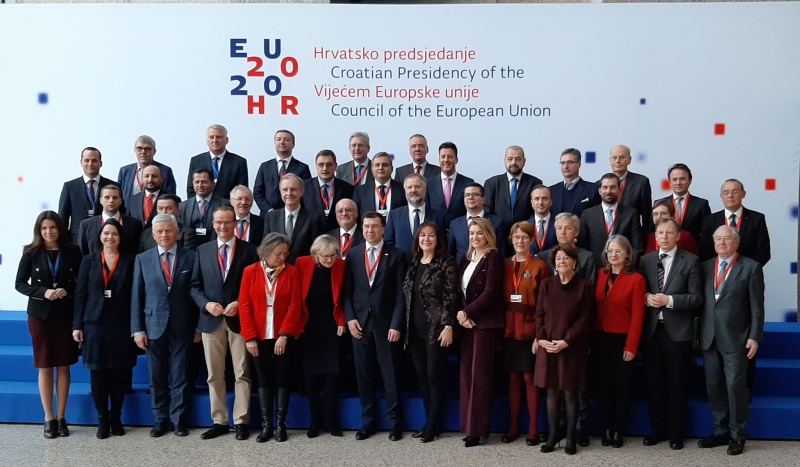Meeting of the Chairpersons of the Conference of Parliamentary Committees for Union Affairs of Parliaments of the EU (COSAC) was marked by presentation of key issues that the Republic of Croatia will address in the framework of the six-month Presidency of the Council of the European Union.
Speaker of the Croatian Parliament Mr Gordan Jandroković said the Croatian presidency was a confirmation of a strong commitment to promoting and advocating a Europe based on shared values, equality and respect for common interests and differences.
The first part of the meeting was devoted to the priorities of Croatian Presidency of the Council of the European Union. Topics to be discussed during the Croatian presidency were reviewed by Croatian Prime Minister Mr Andrej Plenković, Chairperson of the Committee on European Affairs of the Croatian Parliament Mr Domagoj Ivan Milošević, Vice President of the European Commission Ms Dubravka Šuica, First Vice President of the European Parliament Ms Mairead McGuinnes and Chairperson of the Committee on European Affairs German Bundestag Mr Ginter Krihbaum.
Four key priorities of Croatia's EU presidency are Europe that develops, Europe that connects, Europe that protects and Europe that is globally influential. The role of COSAC as an important partner to European institutions and citizens was highlighted.
In his address to the audience, Chairperson of the Committee on European Integration Mr Slaven Radunović emphasised that the Western Balkan countries were seeking the support of the European Union in the implementation of the reforms necessary for the final democratisation of society. According to him, Montenegro's key challenges stem from the most important issues from chapters 23 and 24 - the rule of law, democratic capacity of institutions, media independence and freedom of expression, and more recently, the consequences of the recent adoption of the Law on religious freedoms. He therefore stated that the EU should support the true and lasting political transformation of Montenegro and the countries of the region, without neglecting key issues, and expressed hope that during the Croatian presidency, the EU member states would be well informed about the internal challenges of Montenegro and the countries of the region.
Committee member Mr Momcilo Martinovic spoke about the importance of the Croatian presidency and high expectations when it comes to Montenegro and the region. He emphasised the hope that during the Presidency of the Republic of Croatia, Montenegro will open the last remaining Chapter 8 - Competition, and that a number of negotiation chapters will be closed for which there is internal readiness. Mr Martinović said he was convinced that the European Union would find a model that would properly evaluate the efforts and reforms being implemented by Montenegro, while encouraging the remaining candidate countries to continue the EU negotiation process.
The second session “European Union, national parliaments and COSAC under a new institutional mandate" discussed the organisation of a Conference on the Future of Europe, conceived as a forum for connecting citizens, civil society and European institutions, where they together citizens can assess what kind of Union they want and how it should be governed. The aim of the conference is to engage citizens more actively in the political decision-making process at Union level.
The meeting also discussed the Brexit, a new seven-year financial framework, enlargement policy, a new green plan, the phenomenon of fake news and how the European Union and its institutions should act in the coming period.
On behalf of the Committee on European Integration of the Parliament of Montenegro, the meeting was attended by Chairperson of the Committee Mr Slaven Radunović and member of the Committee Mr Momcilo Martinović.












